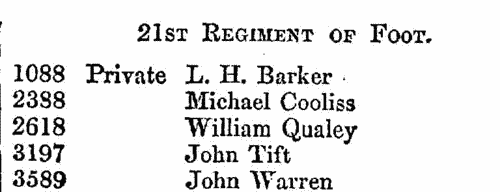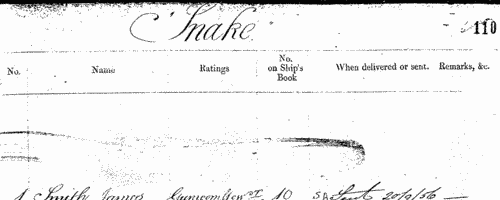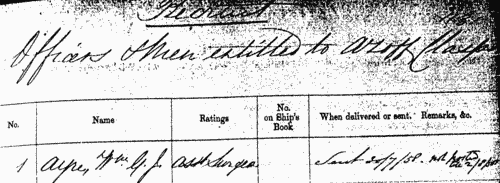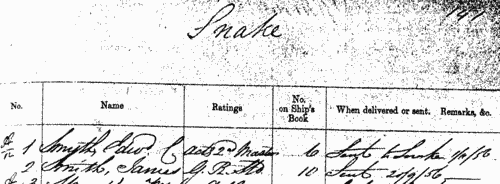Mckillop Surname Ancestry ResultsOur indexes 1850-1950 include entries for the spelling 'mckillop'. In the period you have requested, we have the following 61 records (displaying 1 to 10): Single Surname Subscription | | | Buying all 61 results of this search individually would cost £368.00. But you can have free access to all 61 records for a year, to view, to save and print, for £100. Save £268.00. More... |
These sample scans are from the original record. You will get scans of the full pages or articles where the surname you searched for has been found. Your web browser may prevent the sample windows from opening; in this case please change your browser settings to allow pop-up windows from this site. British soldiers wounded at Inkerman
(1854)
Sebastopol in the Crimea was the great Russian naval arsenal on the Black Sea. A combined assault by British, French and Turkish troops resulted in the reduction of Sebastopol and led to the Treaty of Paris of 27 April 1856, guaranteeing the independence of the Ottoman Empire. In the battle of Inkerman, of November 1854, the Russian troops made an ultimately unsuccessful attack on the allied army. In December the War Office issued lists of soldiers killed and wounded at Inkerman: there are separate returns for 2 to 6 November, 7 to 20 November, and 21 to 26 November, as well as one for soldiers missing, and one for members of the Naval Brigade killed and wounded. This is the list of British soldiers wounded at Inkerman 2 to 6 November 1854.MCKILLOP. Cost: £6.00.  | Sample scan, click to enlarge

|  Naval support staff in the Crimean War
(1854-1856) Naval support staff in the Crimean War
(1854-1856)
Sebastopol in the Crimea was the great Russian naval arsenal on the Black Sea. A combined assault by British, French and Turkish troops resulted in the reduction of Sebastopol and led to the Treaty of Paris of 27 April 1856, guaranteeing the independence of the Ottoman Empire. By Admiralty Order the Crimea Medal was awarded to sailors and marines present during the campaign, between 17 September 1854 (the first landing at Eupatoria) and 9 September 1855 (when the allies secured Sebastopol). Four clasps to this medal were awarded to the men present in the actions at Sebastopol itself, Inkerman, Balaklave (Balaclava) and (the sea of) Azoff, but the recipients of these clasps are recorded on separate rolls, not part of this index, but indexed on this site.MCKILLOP. Cost: £8.00.  | Sample scan, click to enlarge

|  Sailors and marines on H. M. S. Recruit in the Crimean War
(1854-1856) Sailors and marines on H. M. S. Recruit in the Crimean War
(1854-1856)
Sebastopol in the Crimea was the great Russian naval arsenal on the Black Sea. A combined assault by British, French and Turkish troops resulted in the reduction of Sebastopol and led to the Treaty of Paris of 27 April 1856, guaranteeing the independence of the Ottoman Empire. By Admiralty Order the Crimea Medal was awarded to sailors and marines present during the campaign, between 17 September 1854 (the first landing at Eupatoria) and 9 September 1855 (when the allies secured Sebastopol). The sailors' medals were mostly delivered to them on board ship in the course of 1856; the marines' medals were sent to their respective headquarters for distribution. The remarks as to distribution in this medal roll therefore give more specific information as to the whereabouts of the sailor recipients in 1856 than about the marines. Her Majesty's Ship Recruit, a sloop, took part in the assault. Four clasps to this medal were awarded to the men present in the actions at Sebastopol itself, Inkerman, Balaklave (Balaclava) and (the sea of) Azoff, but the recipients of these clasps are recorded on separate rolls, not part of this index, but indexed on this site.MCKILLOP. Cost: £8.00.  | Sample scan, click to enlarge

|  Sailors and marines on H. M. S. Snake in the Crimean War
(1854-1856) Sailors and marines on H. M. S. Snake in the Crimean War
(1854-1856)
Sebastopol in the Crimea was the great Russian naval arsenal on the Black Sea. A combined assault by British, French and Turkish troops resulted in the reduction of Sebastopol and led to the Treaty of Paris of 27 April 1856, guaranteeing the independence of the Ottoman Empire. By Admiralty Order the Crimea Medal was awarded to sailors and marines present during the campaign, between 17 September 1854 (the first landing at Eupatoria) and 9 September 1855 (when the allies secured Sebastopol). The sailors' medals were mostly delivered to them on board ship in the course of 1856; the marines' medals were sent to their respective headquarters for distribution. The remarks as to distribution in this medal roll therefore give more specific information as to the whereabouts of the sailor recipients in 1856 than about the marines. Her Majesty's Ship Snake took part in the assault. Four clasps to this medal were awarded to the men present in the actions at Sebastopol itself, Inkerman, Balaklave (Balaclava) and (the sea of) Azoff, but the recipients of these clasps are recorded on separate rolls, not part of this index, but indexed on this site.MCKILLOP. Cost: £8.00.  | Sample scan, click to enlarge

|  Sailors of H. M. S. Recruit who fought in the Azoff Sea
(1854-1856) Sailors of H. M. S. Recruit who fought in the Azoff Sea
(1854-1856)
Sebastopol in the Crimea was the great Russian naval arsenal on the Black Sea. A combined assault by British, French and Turkish troops resulted in the reduction of Sebastopol and led to the Treaty of Paris of 27 April 1856, guaranteeing the independence of the Ottoman Empire. By Admiralty Order the Crimea Medal was awarded to sailors and marines present during the campaign, between 17 September 1854 (the first landing at Eupatoria) and 9 September 1855 (when the allies secured Sebastopol). Her Majesty's Ship Recruit, a sloop, took part in the assault. Four clasps to this medal were awarded to the men present in the actions at Sebastopol itself, Inkerman, Balaklave (Balaclava) and (the sea of) Azoff. The Sea of Azoff (Azov, Azoph, Azof), east of the Crimean peninsula, is an arm of the Black Sea, with which it is united by the Straits of Kertch or Kaffa. This is the Azoff Clasp Roll, recording the names of the men from the ship who took part in the actions on the Azoff Sea during the Crimean War.MCKILLOP. Cost: £8.00.  | Sample scan, click to enlarge

|  Sailors of H. M. S. Snake who fought in the Azoff Sea
(1854-1856) Sailors of H. M. S. Snake who fought in the Azoff Sea
(1854-1856)
Sebastopol in the Crimea was the great Russian naval arsenal on the Black Sea. A combined assault by British, French and Turkish troops resulted in the reduction of Sebastopol and led to the Treaty of Paris of 27 April 1856, guaranteeing the independence of the Ottoman Empire. By Admiralty Order the Crimea Medal was awarded to sailors and marines present during the campaign, between 17 September 1854 (the first landing at Eupatoria) and 9 September 1855 (when the allies secured Sebastopol). Her Majesty's Ship Snake took part in the assault. Four clasps to this medal were awarded to the men present in the actions at Sebastopol itself, Inkerman, Balaklave (Balaclava) and (the sea of) Azoff. The Sea of Azoff (Azov, Azoph, Azof), east of the Crimean peninsula, is an arm of the Black Sea, with which it is united by the Straits of Kertch or Kaffa. This is the Azoff Clasp Roll, recording the names of the men from the ship who took part in the actions on the Azoff Sea during the Crimean War.MCKILLOP. Cost: £8.00.  | Sample scan, click to enlarge

|  Sailors and marines awarded the Baltic Medal
(1854-1857) Sailors and marines awarded the Baltic Medal
(1854-1857)
During the Crimean War, a British and French fleet entered the Baltic, and captured Bomarsund harbour and one of the Aland Islands (now part of Finland). Bomarsund is the sound between the islands and the Swedish island of Vardo; and at the fine harbour on Bomarsund, dominating the entrance of the Gulf of Bothnia, and indirectly that of the Gulf of Finland, the Russians had constructed a northern naval base, and this was destroyed in the attack. The British fleet taking part in the Baltic expedition comprised Her Majesty's ships Aeolus, Ajax, Alban, Algiers, Amphion, Archer, Arrogant, Basilisk, Belleisle, Blenheim, Boscawen, Bulldog, Caesar, Calcutta, Centaur, Colossus, Conflict, Cornwallis, Cossack, Cressy, Cruizer, Cuckoo, Cumberland, Dauntless, Desperate, Dragon, Driver, Duke of Wellington, Edinburgh, Esk, Euryalus, Exmouth, Falcon, Firefly, Geyser, Gladiator, Gorgon, Hannibal, Harrier, Hastings, Hawke, Hecla, Hogue, Imperieuse, James Watt, Leopard, Lightning, Locust, Magicienne, Majestic, Merlin, Miranda, Monarch, Neptune, Nile, Odin, Orion, Otter, Pembroke, Penelope, Pigmy, Porcupine, Prince Regent, Princess Royal, Pylades, Resistance, Retribution, Rhadamanthus, Rosamond, Royal George, Royal William, Russell, St George, St Jean D'Acre, St Vincent, Sphinx, Stromboli, Tartar, Termagant, Tribune, Tyne, Valorous, Volage, Volcano, Vulture, Wrangler and Zephyr. This is the medal roll of the naval and marine claimants who qualified for the Baltic Medal for service in 1854 to 1855. The medals were dispatched in batches from early 1857, the first batch being numbered B A 1, the next B A 2, &c.; then follows the destination (a place or, more usually, a ship) and the date of dispatch. Most of the medals had been sent by the end of 1857.MCKILLOP. Cost: £8.00.  | Sample scan, click to enlarge

| Bengal Civil Servants: Fourth Class
(1857)
The East India Register and Army List was compiled, by permission of the East India Company, from the official returns received at the East India House. The list of civil servants in Bengal presidency is arranged by class of rank, and then by seniority of appointment. The season of appointment is given on the left, then name (usually in the form christian name, initials for middle names, surname) and current position, or if on furlough - except in the case of the appointees of the season of 1856 in the sixth class, where no position is stated, and christian names are given only as initials.MCKILLOP. Cost: £6.00.  | Sample scan, click to enlarge

|  Sailors on board Her Majesty's steam vessel Coromandel, tender to Her Majesty's ship Calcutta
(1857-1858) Sailors on board Her Majesty's steam vessel Coromandel, tender to Her Majesty's ship Calcutta
(1857-1858)
The China Medal was awarded to soldiers and sailors involved in the various actions of the war against China, in which this boat was engaged from 1857 to 1858. The medals were either delivered on board or sent on in 1862: except that many of the men were no longer immediately traceable, and the remarks on the roll show that some medals were not sent on for several years, and some were never sent.MCKILLOP. Cost: £8.00.  | Sample scan, click to enlarge

| Customs Officers in Glasgow
(1858)
Complete lists of serving customs officers and clerks in the Port of London and all the outports of Britain and Ireland (including the Isle of Man and the Channel Islands) were published each year in The British Tariff. This issue is corrected to 30 September 1858: the sample scan shows the entry for Hartlepool.MCKILLOP. Cost: £6.00.  | Sample scan, click to enlarge

|
Research your ancestry, family history, genealogy and one-name study by direct access to original records and archives indexed by surname.
|













